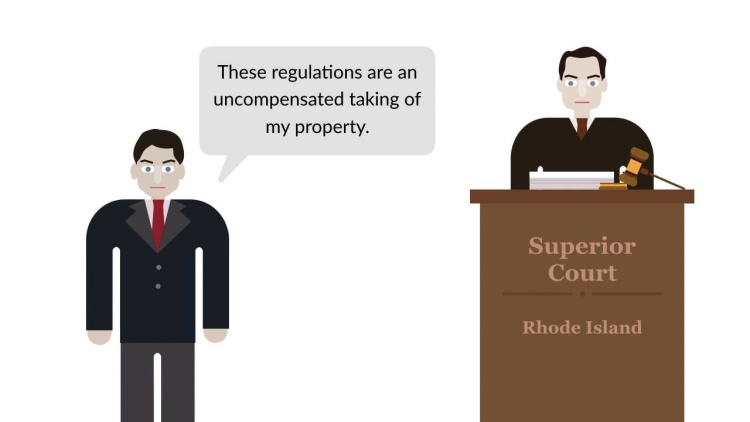Palazzolo v. Rhode Island
United States Supreme Court
533 U.S. 606 (2001)
- Written by Jamie Milne, JD
Facts
In 1959, Shore Gardens, Inc. (SGI) purchased substantial coastal property in Rhode Island (defendant). In 1971, a state agency adopted regulations designating 18 acres of SGI’s land as protected wetlands. Under the regulations, a landowner needed a special exception from the agency to fill protected wetlands. An exception could be granted only if for a compelling public purpose providing a benefit to the public as a whole. In 1978, SGI ceased to exist, and title to the property passed to its sole shareholder, Anthony Palazzolo (plaintiff). Palazzolo applied twice for an exception, seeking permission first to fill the entire 18 acres and then to fill 11 acres to build a private beach club. Both applications were denied. Palazzolo sued Rhode Island. He claimed that the regulations deprived him of the economically beneficial use of his property and were therefore an inverse condemnation, also known as a regulatory taking, in violation of the Fifth Amendment’s Takings Clause. At trial, evidence showed that an upland parcel of Palazzolo’s property could likely be developed for residential use. The state trial court, appellate court, and supreme court all rejected Palazzolo’s position, reasoning that Palazzolo could not allege a taking based on regulations already on the books when he acquired ownership of the property. The United States Supreme Court granted certiorari.
Rule of Law
Issue
Holding and Reasoning (Kennedy, J.)
Concurrence (O’Connor, J.)
What to do next…
Here's why 902,000 law students have relied on our case briefs:
- Written by law professors and practitioners, not other law students. 47,100 briefs, keyed to 994 casebooks. Top-notch customer support.
- The right amount of information, includes the facts, issues, rule of law, holding and reasoning, and any concurrences and dissents.
- Access in your classes, works on your mobile and tablet. Massive library of related video lessons and high quality multiple-choice questions.
- Easy to use, uniform format for every case brief. Written in plain English, not in legalese. Our briefs summarize and simplify; they don’t just repeat the court’s language.





